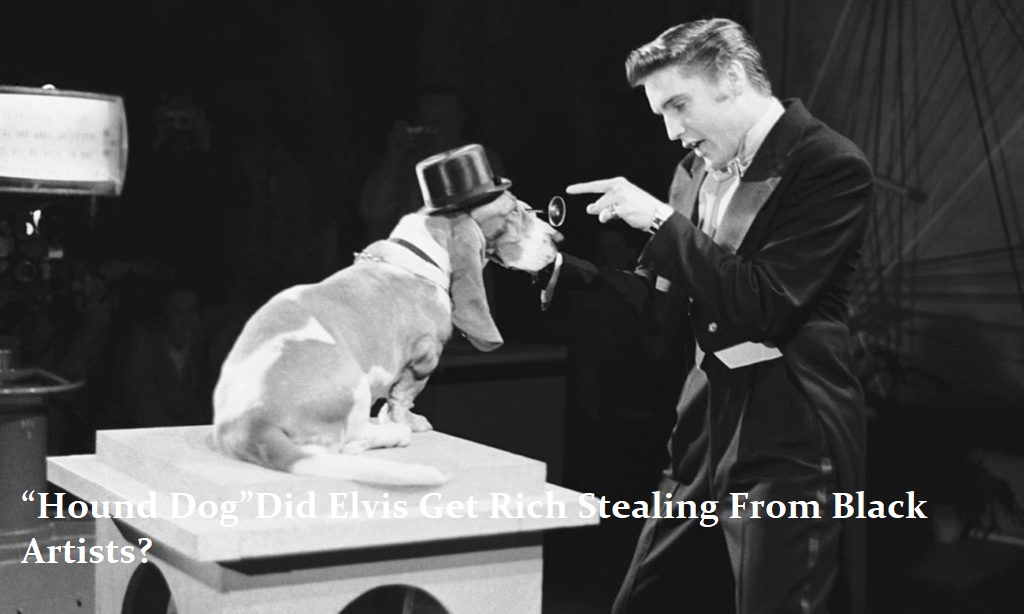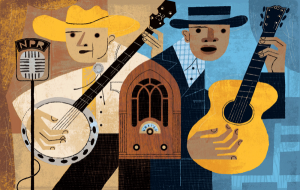“Hound Dog”Did Elvis Get Rich Stealing From Black Artists?

You get interested in the origins of rock. You realise that black r’n’b had a significant influence on it. You note that the wealthy and well-known were disproportionately made up of white artists. You may thus draw the conclusion that more talented black artists were responsible for the success of less talented white artists. that they essentially cheated them. Many people have reached the same conclusion.
Also Read: –Key-Insights To Different Performance Characteristics Of Folk Music
True?
Hey, there’s never been a larger performer than Elvis, and it’s indisputable that he owes black music. And your case seems to be established when you find out that his signature hit, “Hound Dog,” was originally recorded by a black woman you’ve never heard of. Here is a blog post that makes that exact point and includes a clip of the Thornton version(1):
‘Big Mama Thornton’s “Hound Dog”… Before Elvis stole it
That’s correct…
Big Mama Thornton, a Black female blues singer, was the author of the song “Hound Dog,” which Elvis stole.
Is that not some shit? This is just a small sample of how famous one may get off of a stolen tune. White men have long since stolen every facet of Black music. For many years, this woman received no recognition for her song!
It goes something like this: “‘Hound Dog’ was an authentic product of black culture, which a race-insensitive (or even racist) Elvis ripped off, in the process reaping the rewards that duly belonged to its originator.” This is just one example of a particular strain of puddle-deep music criticism that is almost its own genre.
Sort of, but in general, no
There’s a Gumbo.
At the request of a Greek producer who essentially lived as a black man (the inimitable Johnny Otis), “Hound Dog” was written for a black r’n’b shouter (Thornton), who, it’s true, never made much money from it, but only because she was bound by an onerous contract to a black-owned record label. It was written by two young urban Jewish leftists who idolised black culture (the legendary Jerry Lieber and Mike Stoller).
Also Read:- Five Strong Roots Albums By Five Strong Women
And for this reason, I adore the tale of “Hound Dog”: it perfectly captures the intricate interweavings of race and ethnicity that made 20th-century American vernacular music such a potent cultural force.
The Story Deepens
Far from becoming a forgotten song, Thornton’s rendition of “Hound Dog” was a tremendous smash with the urban r’n’b audience. Such a big deal that a black musician, the incredible Rufus Thomas, quickly created a response song for a white label owner, the unclassifiable Sam Phillips, who had the idea to combine black and white music into pop songs. Naturally, Phillips would find the means to realise his ambition in a young white youngster who also loved black music. Elvis would have been aware with both Rufus Thomas’ response to “Bear Cat,” the first smash for Sun Records, and Big Mama’s rendition of “Hound Dog.”
After riding the rock ‘n’ roll wave to new pop stardom, Elvis, during his first, unsuccessful run in Las Vegas, hears a completely reworked version of the song by a white r’n’ b lounge act, (Freddy Bell and the Bellboys), and adopts it as his own, playing it in his live performances and in two iconic television appearances before recording it in New York City. It does indeed become a pop smash, peaking at #1, but here’s the astonishing part: it also tops the r&b charts…AND the country & western charts! Nothing else before or since has accomplished that. “Hound Dog” symbolised a unique period in history when the public’s tastes, regardless of race, were practically unanimous.
Whole Story
Space restrictions prevent me from going into further detail here, but there are other issues as well, including disagreements over authorship credits and copyright, the origins of the Thornton and Presley recordings, and more. There’s a book there for sure, and I’ll write it one day. However, for the time being, a podcast will do; initially broadcast on listener-supported KOWS,
Big Mama Thornton was not the source of the 1956 hit song “Hound Dog,” according to Mike Stoller, one of the song’s original writers. 89-year-old Stoller retold the tale of how Presley came to be associated with the popular song.
Within 15 minutes of hearing Thornton sing, Stoller and his late writing partner, the late Jerry Leiber, composed “Hound Dog” in its original form. Stoller recalled his first encounter with Thornton: “I don’t remember precisely what the song was, but she knocked us out.”
Thornton first recorded the song in 1952, and Presley released his version of it four years later. Despite the fact that Thornton’s “Hound Dog” was a hit and spent seven weeks at No. 1 on the Billboard R&B chart, neither the songwriters nor Thornton were ever given credit for the song’s creation. Regarding the circumstances surrounding the song’s initial release, Stoller commented, “I was quite furious with what occurred.”
Once Presley released his popular version of “Hound Dog,” which topped the R&B and mainstream charts and was later honoured by being inducted into the Grammy Hall of Fame in 1988, the two finally received royalties from the song. Even after the song she originally recorded continued to be popular, Thornton still didn’t receive any money. According to interviewer Brian Hiatt, this may have been because of the corruption in the music industry at the time and “systemic racism.” Hiatt concurred, saying “That’s true of many black performers and songwriters, not just Big Mama.”
Freddie Bell and the Bellboys’ 1955 recording of “Hound Dog” was the inspiration for Presley’s version of the song, according to Stoller. This version had a simpler chord structure and different lyrics that shifted the song’s focus from a man acting like a “dog” toward a lady to a dog
Also Read; –Your Introduction Guide To America’s Popular Folk Music
The lyricist claimed that Presley “was doing it pretty much the way they [Freddie Bell and the Bellboys] had written the song and it seemed to be about a dog” and that she “never stole the spirit of what Thornton accomplished with her version.” According to Stoller, Presley’s rendition of “Hound Dog” “didn’t have the groove that Big Mama’s record had, which was amazing,” and he preferred Thornton’s version.










